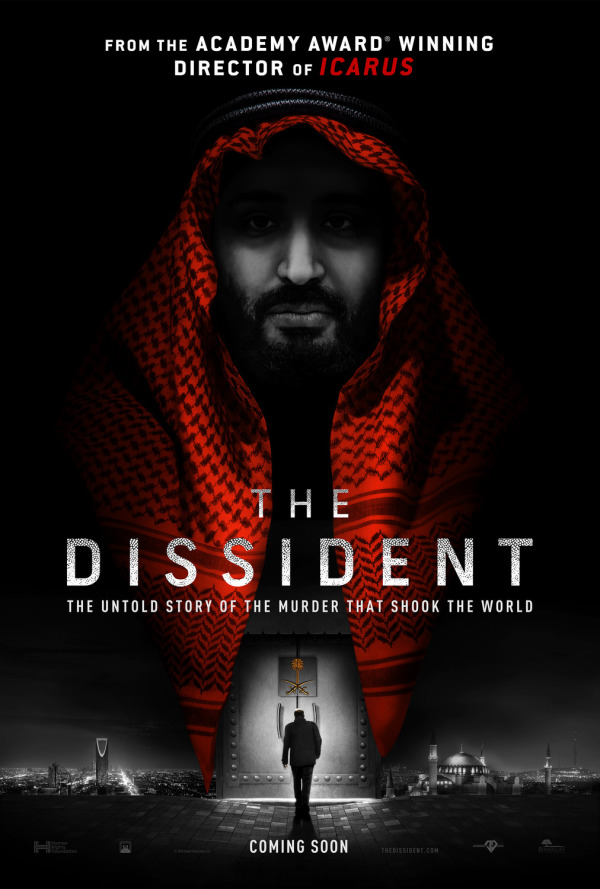THE DISSIDENT (directed by Bryan Fogel, 119 minutes, USA, 2021)
![]() BY DAN TABOR FILM CRITIC There’s been no shortage of great political docs this awards season, and the most intriguing offerings seem to be the ones surprisingly absent from the bigger streaming services. Alongside Assassins, Ryan White’s excellent deep dive into the assissination of Kim Jong-nam, is The Dissident, the latest film by Bryan Fogel (Icarus). Like the Assassins, The Dissident digs into another polictically motivaved murder, that went unpunished: the murder and dismemberment of Washington Post journalist Jamal Khashoggi by a government-sponsored Saudi death squad. Where The Dissident differs from Assassins is how it masterfully director Bryan Fogel frames the story on the world stage, leaving the viewer with quite a bit of food for thought after the credits roll.
BY DAN TABOR FILM CRITIC There’s been no shortage of great political docs this awards season, and the most intriguing offerings seem to be the ones surprisingly absent from the bigger streaming services. Alongside Assassins, Ryan White’s excellent deep dive into the assissination of Kim Jong-nam, is The Dissident, the latest film by Bryan Fogel (Icarus). Like the Assassins, The Dissident digs into another polictically motivaved murder, that went unpunished: the murder and dismemberment of Washington Post journalist Jamal Khashoggi by a government-sponsored Saudi death squad. Where The Dissident differs from Assassins is how it masterfully director Bryan Fogel frames the story on the world stage, leaving the viewer with quite a bit of food for thought after the credits roll.
At its core. The Dissident is the shocking story of the 2018 assassination of Saudia Arabian journalist Jamal Khashoggi at the Saudi consulate in Istanbul in plain sight of the entire world. The film paints Khashoggi as a gregarious gentleman who truly loved his country, and wanted to bring real “fair and balanced” journalism to a nation where the role of the press is to serve as a de facto PR department disseminating the state-sponsored narrative of the Saudi royal family. Khashoggi’s boundary-pushing critiques of those in power led to his frequent dismissals from Saudi news outlets and threats of impending arrest which eventually led to a self-imposed exile in Europe, far away from family and country. While the film’s first two acts are full of sporadic info dumps, interspersed with a tense narrative of political intrigue and cyber espionage, it works to give a much needed context to the line that Khashoggi eventually crosses, resulting inthe Crown Prince Mohammed bin Salman ordering his death.
Fogel immediately challenges the viewer with a methodical recounting of the history of the Saudi’s 100 year old monarchy and how over the last century they have influenced the balance of power in the Middle East in their favor. While it may at first feel over indulgent, the background helps give necessary context to the forthcoming narrative since we find Khashoggi was not only being a mouthpiece for the government as a journalist, but also rumored agent for the Saudi Arabian Intelligence Agency. It’s how these two stories finally collapse into one under the theme of cyberterroism that lets the viewer fully understand how the tragedy unfolded while the world watched Khashoggi’s fate unfold in those days after his disappearance powerless.
Given the Saudi’s penchant for hacking their enemies, a key plot point in the film, it’s understandable that some distros may be a bit reluctant to carry the film and amplify its cry for justice. Remember what happened to Sony when it dared to mock North Korea for fun and profit? This only adds to the film’s urgency at a time when cyber attacks are becoming more frequent. It’s this sinister thread of the power of information and how the Saudi’s wield it as a weapon that the film closes on, leaving the viewer with an overwhelming sense of dread. It’s simply masterful how Fogel is able to educate through news clips and interviews as he slowly pulls back the focus and the bigger picture finally reveals itself. While we can all agree the death of Jamal Khashoggi is a tragedy and that in itself would have been a good enough film, Fogel isn’t simply satisfied with that rather superficial hot take. The Dissident instead, leaves the viewer with a deep understanding of the much more terrifying machinations which enabled it and how they are still at work today.

